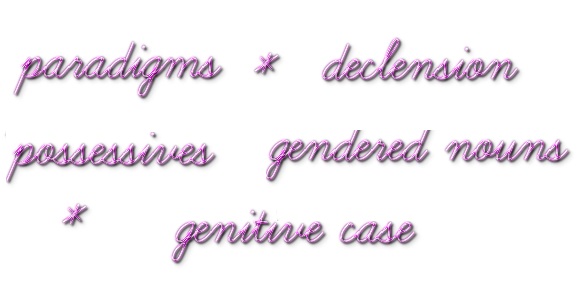 English Noun Inflections
English Noun Inflections
English noun inflections alter the noun to convey a more specific meaning and give more information about that noun. Noun inflections include additional or altered letters to convey a plural, and adding apostrophes to indicate possession.
Read on to find out more about English noun inflections and improve your use and understanding of nouns in the English language.
Noun Paradigms
Where the verb stem may stand alone as an infinitive (e.g. ‘to pull’) imperative (e.g. ‘pull!’), or general present form (e.g. ‘I/you pull’), the noun stem may only stand alone as a singular noun.
Noun paradigms have two forms: a stem form, which is normally the singular, and a plural form, which normally adds an ‘s’.
Declension
Inflection of nouns in English is called declension. Noun paradigms inflect for number but not for gender or case. For example, the singular ‘chair’ takes the suffix ‘s’ to become ‘chairs’: the number of chairs has clearly increased.
If the speaker wants to talk about the leg of the chair, the word ‘of’ should be used to avoid adding an apostrophe ‘s’ (the possessive suffix) i.e. ‘the ‘chair’s leg’. This is because possessives should preferably not be used for inanimate objects.
Possessives and Apostrophes
If a possessive is used with the word ‘it’, then there is no apostrophe. For example, ‘The dog knew its own name’, ‘Justice is its own reward’, ‘The door came off its hinges’.
If an apostrophe is used with ‘it’, this becomes a contraction of ‘it is’. For example, ‘It’s time to go out’, ‘The computer won’t start because it’s broken’.
Irregular Inflections
Some noun stems take different inflectional affixes or none at all. For example:
- The word ‘mouse’ becomes ‘mice’ in the plural and does not take the suffix ‘s’
- The word ‘sheep’ stays the same in the plural without taking any affix
- The word ‘medium’ becomes ‘media’ in the plural, here losing the ‘um’ ending and replacing it with ‘a’ (because this word is derived from Latin)
- The word ‘fungus’ becomes ‘fungi’ and the word ‘cactus’ becomes ‘cacti’ in the plural (but strangely, ‘octopus’ changes to the regular ‘octopuses’)
Nouns ending with ‘y’ often lose the ‘y’ and take ‘ies’ to make a plural. For example, ‘charity’ becomes ‘charities’. (Be careful not to confuse this with the possessive ‘charity’s’).
So, the English noun has only two inflected forms: inflection due to number (plural) and inflection due to possession (the genitive case). Noun inflections do not occur in any other instances.
Gender in English Nouns
Despite nouns being generally non-gendered in English grammar, the third person singular pronouns can indicate gender. So, the words ‘he’ and ‘she’ are gendered, although ‘it’ is not. Because of this, the gender of a person is always communicated when using a pronoun.
For example, the sentence, ‘the chef cooked the meal; she did a good job’, tells us that the gender of the chef is female, by the use of the word ‘she’.
However, the plural pronouns, such as ‘everybody’, ‘somebody’, ‘the public’, ‘the children’ are not gendered.
His, Her or Their?
There is some controversy over which word to use for the pronoun’s antecedent in sentence where the third person singular is needed but is of indeterminate gender.
For example, ‘Did everybody set … alarm today?’ where the dots indicate a missing word.
In traditional formal use, the pronoun chosen is often ‘his’ when gender is irrelevant. However, as the receiver could be female in 50% of cases, this feels wrong to modern ears.
The use of ‘his’ in the place of a non-gendered pronoun is simply a result of patriarchal influence on language, which has created a sexist preference for the masculine pronoun.
Indeed, assuming the social gender or biological sex of a person or group of people today may be seen as offensive.
In order to imply gender neutrality in pronoun usage, many people use the word ‘their’ or sometimes ‘his / her’ in writing. In speech, using ‘their’ is most common, while you can also say ‘his or her’.
In recent year, there have been some interesting alternatives suggested for non-gendered pronouns, with ‘xe’ and ‘ze’ popular choices. Although embraced by many young people, these new pronouns have yet to enter mainstream usage.
Gendered Nouns
Nouns can be gendered but not by use of noun inflections. Different words are used instead. For example: mother, father, uncle, niece, actress, heroine, Lord, Dame, doe, bull, witch.
We know the gender of the people and animals here by the words themselves and not by the use of any inflectional affixes.
We can also have unisex nouns. For example: child, parent, teacher, sibling, cook, driver, politician, runner, pianist, assistant, student, writer, basketball player, mouse.
Possession and the Genitive Case
The possessive case or genitive case uses the inflection ‘‘s’ at the end of the noun to indicate possession – for example, ‘the woman’s coat’.
The possession can also be indicated by the ‘‘s’ being attached to another word but still in relation grammatically to the subject.
For example, ‘the woman over there’s coat’. The coat belongs to the woman, yet the word ‘there’ in this instance takes the suffix.
Be aware that when we use possessive pronouns that take an ‘s’, we do not use an apostrophe. For example, yours, theirs, ours and hers: ‘The decision is ours’, ‘The coat is hers’ and ‘The house is theirs’.
Are there any particular noun inflections you find difficult to understand or have trouble remembering? Let us know your experiences by leaving a reply in the comments box.


very useful information…
Glad you enjoyed the page, Farlen. Thanks for taking time to comment. You might also like our nouns and pronouns article with sections on personal and reflexive pronouns.
Very helpful.